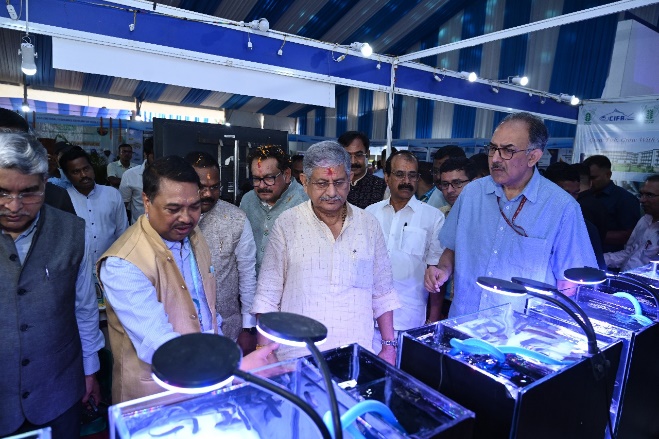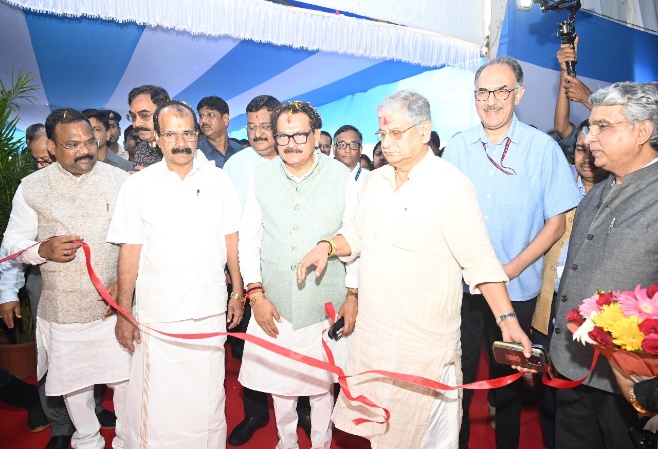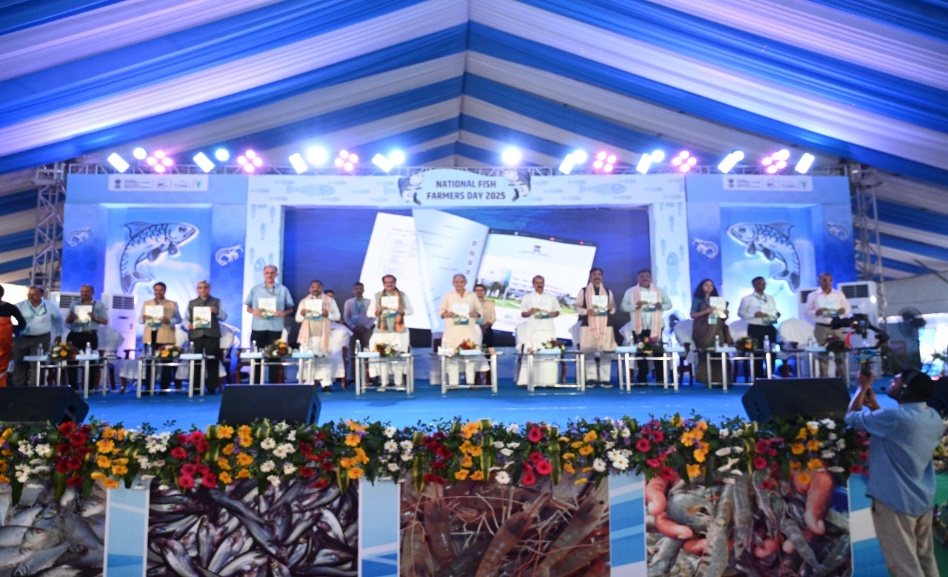Ministry of Fisheries, Animal Husbandry & Dairying
Union Minister Shri Rajiv Ranjan Singh, Ministry of Fisheries, Animal Husbandry & Dairying (MoFAH&D), launches 17 New Fisheries Clusters on the occasion of National Fish Farmer Day 2025 on 10th July 2025 at ICAR-CIFA, Odisha
प्रविष्टि तिथि:
10 JUL 2025 10:34PM by PIB Delhi
The Department of Fisheries, Ministry of Fisheries, Animal Husbandry & Dairying (MoFAH&D), GoI, celebrated National Fish Farmers Day 2025 at ICAR- Central Institute of Freshwater Aquaculture (CIFA), Bhubaneshwar, Odisha on 10th July 2025 to recognise the accomplishments and contribution of fishers, fish farmers and fisherfolks in the growth of the fisheries sector in the country.
During the celebration Union Minister Shri Rajiv Ranjan Singh, MoFAH&D and Ministry of Panchayati Raj launched 17 New fisheries clusters under the Pradhan Mantri Matsya Sampada Yojana (PMMSY) PMMSY to boost and upscale the Fisheries sector. These newly launched clusters are in addition to the 17 existing clusters, increasing the total number of fisheries clusters across the country to 34. Furthermore, Union minister inaugurated and laid foundation stone for 70 projects with an outlay of Rs 105 crore covering 11 states.


Furthermore, Union Minister launch a series of key fisheries initiatives including the announcement of release of the ICAR Training Calendar and unveiling of guidelines on seed certification and hatchery operations—aimed at ensuring quality, standardization, and capacity building in the fisheries sector. The Union Minister also felicitated fisheries beneficiaries, including traditional fishers, cooperatives/FFPOs, KCC cardholders, and promising fisheries start-ups.

Shri Rajiv Ranjan Singh, Union Minister, MoFAH&D and Ministry of Panchayati Raj appreciated the dedication and tireless efforts of India’s fishers and fish farmers, attributing to them the remarkable achievement of India becoming the second-largest fish producer in the world, with inland fisheries contributing nearly 75% of the total production. The fisheries sector today ensures nutrition and livelihoods for over 3 crore fishers and fish farmers. Under the visionary leadership of Prime Minister Shri Narendra Modi, the Government has made a historic investment of ₹38,572 crore through various schemes and initiatives , significantly enhancing incomes and livelihood security across the sector. Focus was laid on improving production and productivity through technology adoption, collaborative planning, and a structured national training framework, covering areas such as multi-species aquaculture, disease management, value addition, marketing, and global best practices. The importance of cluster development was reinforced as a strategy for scaling up production. Fish farmers were encouraged to leverage financial assistance under the Kisan Credit Card (KCC) scheme. Strong emphasis was placed on monitoring outcomes to drive measurable progress towards the realisation of Vision 2047 for a resilient, inclusive, and globally competitive fisheries sector.
Prof. S.P. Singh Baghel, Minister of State for Fisheries, Animal Husbandry, Dairying, and Panchayati Raj, underscored the critical role of the fisheries sector in doubling farmers' income under the vision of the Blue Revolution. Emphasis was laid on the innovations and advanced technologies developed by ICAR fisheries research institutes, which have significantly contributed to the increase in fish production and productivity across the country. Fishers and fish farmers were encouraged to actively leverage the various government support mechanisms, including insurance schemes, access to quality seed, modern technologies, and innovative practices, to enhance their income and strengthen their livelihoods.
Shri George Kurian, Minister of State, Ministry of Fisheries, Animal Husbandry & Dairying and Ministry of Minority Affairs, congratulated all stakeholders for reaching a record fish production of 195 lakh tonnes, marking a 105% increase over the past decade—a testament to the dedication and hard work of India’s fishers and fish farmers. He appreciated the invaluable contributions of the fish farming community and encouraged them to continue striving for even greater success, reaffirming the Government's support in their journey toward a more prosperous and sustainable future.
The Department of Fisheries, Government of India has envisaged a strategic focus on cluster development across key areas, including Pearl cluster in Hazaribagh, Seaweed in Lakshadweep, Ornamental Fisheries in Madurai, Reservoir Fisheries in Madhya Pradesh, Fishing Harbours in Gujarat, Saline Water Aquaculture in Sirsa, Cold Water Fisheries in Jammu and Kashmir, Sea Cage Culture in Karnataka, Brackish-Water Fisheries in Andhra Pradesh, Tuna in Andaman & Nicobar Islands, Tilapia in Chhattisgarh, Organic Fisheries in Sikkim, Wetland Fisheries in Bihar, Murrel in Telangana, Pearl Spot in Kerala, Scampi in Odisha, Pangasius in Uttar Pradesh.
In addition, 17 new cluster have been identified with focus on Saline Water Aquaculture in Punjab and Rajasthan, Coldwater fisheries in Uttarakhand, Himachal Pradesh and Ladakh, Dry Fish Cluster in West Bengal, Fishing Harbour in Puducherry, Integrated fish farming cluster in Nagaland, Pengba Fish Cluster in Manipur, Riverine Fish Cluster in Assam, Paddy cum Fish Cluster in Mizoram, Aqua Tourism Cluster in Arunachal Pradesh, Estuarian Cage Cluster in Goa, Pabda Fisheries Cluster in Tripura, Fisheries Cooperatives Cluster in Maharashtra and Organic Fisheries Cluster in Meghalaya.
The cluster-based approach enhances competitiveness and efficiency by uniting geographically connected enterprises of all sizes - micro, small, medium, and large-across the entire value chain, from production to exports. This collaborative model improves financial viability through strong linkages, addresses value chain gaps, and creates new business opportunities and livelihoods. By fostering partnerships and resource sharing, it aims to reduce costs, promote innovation and support sustainable practices.
the clusters will engage a diverse range of stakeholders, including fishers, enterprises, individuals, SHGs, JLGs, FFPOs, fish farmers, processors, transporters, vendors, cooperatives, fisheries start-ups, and other entities, ensuring holistic development and efficient management of the fisheries and aquaculture value chain. To strengthen the identified clusters, collaboration will be undertaken with the Ministry of Food Processing Industries, NABARD, the Ministry of Micro, Small & Medium Enterprises (MSME), Department of Fisheries, GoI. This partnership will focus on enhancing. infrastructure, financial support, and market linkages while fostering entrepreneurship and value addition in the fisheries sector. Additionally, convergence with relevant schemes and programs will be explored to maximize impact and ensure sustainable development.
Dr Abhilaksh Likhi, Secretary, MoFAH&D, highlighted major initiatives including Aquapark in Sambalpur, scampi hatcheries, and disaster preparedness in 18 cyclone-prone villages. He emphasized Odisha’s key role in meeting India’s 195 lakh tonne fish production target, and the government's focus on deep-sea fishing, harbour modernization, and capacity building through ICAR.
Shri Sagar Mehra, Joint Secretary (Inland) welcomed the gathering and highlighted the significant strides made in the fisheries sector, setting the tone for the proceedings of the event. Ms Neetu Prasad, Joint secretary (Marine) delivered the vote of thanks which brought the event to a
***
RN
(रिलीज़ आईडी: 2143904)
आगंतुक पटल : 525